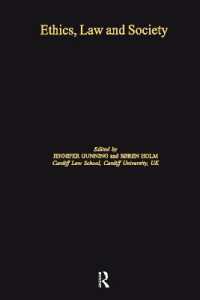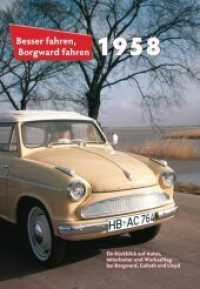- ホーム
- > 洋書
- > 英文書
- > Religion / Ethics
Full Description
Since the end of state repression against religion, two major processes have taken place in the formerly socialist countries: historically dominant churches strive to reassert their position in society, while new religious groups and ideas from various parts of the world are proliferating. This generates pluralism of religious communities and individual religious attitudes. Religious Diversity in Post-Soviet Society presents the first collection of ethnographies of this new religious diversity for Lithuania, a country that has a long history of a dominant Catholic Church. The authors reveal how Catholicism has become increasingly diversified and other religions (Charismatic Protestantism, Baltic Paganism, Eastern religions and other alternative spiritualities) are claiming their space in the religious field.
Contents
Introduction, Milda Ališauskien?, Ingo W. Schröder; Chapter 1 Catholic Majority Societies and Religious Hegemony: Concepts and Comparisons, Ingo W. Schröder; Chapter 2 The History of Religion in Lithuania since the Nineteenth Century, Ar?nas Streikus; Chapter 3 "We Are All in Exile Here": Perceptions of Death, the Soul, and the Afterlife in Rural Lithuania, Lina Pranaityt? Wergin; Chapter 4 The Elusive Religious Field in Lithuania, Ingo W. Schröder; Chapter 5 From Confrontation to Conciliation: On Syncretic Rapprochement between Catholics and Charismatic Evangelists in Lithuania, Gediminas Lankauskas; Chapter 6 Romuva Looks East: Indian Inspiration in Lithuanian Paganism, Michael F. Strmiska; Chapter 7 The New Age Milieu in Lithuania: Popular Catholicism or Religious Alternative?, Milda Ališauskien?; Chapter 8 Muslims in Catholic Lithuania: Divergent Strategies in Dealing with the Marginality Status, Egd?nas Ra?ius; Chapter 9 The Neo-Buddhist White Lotus Movement in Search for Legitimacy, Donatas Glodenis; conclusion Concluding Thoughts, Ingo W. Schröder;







